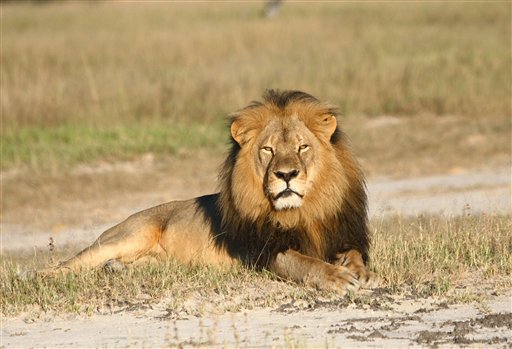
In this undated photo provided by the Wildlife Conservation Research Unit, Cecil the lion rests in Hwange National Park, in Hwange, Zimbabwe. Two Zimbabweans arrested for illegally hunting a lion appeared in court Wednesday, July 29, 2015. The head of Zimbabwes safari association said the killing was unethical and that it couldnt even be classified as a hunt, since the lion killed by an American dentist was lured into the kill zone. (Andy Loveridge/Wildlife Conservation Research Unit via AP)
HWANGE, Zimbabe—When he was alive, Cecil the lion was famous among the thousands of annual visitors to Zimbabwe’s top game reserve, but in death he achieved truly global recognition.
READ: US man accused in African lion death thought hunt was legal
Born in Hwange National Park in northwestern Zimbabwe about 13 years ago, Cecil was killed earlier this month by an American trophy hunter who allegedly paid $50,000 for the expedition.
Cecil was described by conservationists as a “confident” and “majestic” animal who featured in countless photographs taken by safari-goers from around the world.
“He was a majestic animal with a big black mane… the most beautiful of animals,” Zimbabwean conservationist Johnny Rodrigues told Agence France-Presse (AFP), adding Cecil had sired around a dozen cubs.
“He never created any problems, he always walked with his family.”
Oxford researcher Brent Stapelkamp, who may have been the last person to photograph Cecil a few days before he was killed and had monitored him for nine years, said Cecil offered the “total lion experience”.
“Cecil was the most confident lion you ever met,” Stapelkamp told Britain’s Daily Telegraph newspaper. “He knew he was the biggest on the block.”
“He was confident, but not aggressive.”
Conservationists admit that most ordinary Zimbabweans were unaware of Cecil’s existence until after his death.
But he was a firm favorite among tourists visiting Hwange National Park.
“He became an icon because a lot of tourists from around the world that have been to Zimbabwe have seen this lion,” said Rodrigues.
“He was such a calm, collected animal.
“He came past humans in cars and… he just carried on like he was a master.”
Dominant male
Cecil was fitted with a tracking collar as part of a University of Oxford research program in Hwange park to establish how lions live, including details on how they breed.
It is generally believed that he was named after British imperialist Cecil Rhodes, who colonized Zimbabwe in the late 1800s and who is buried in the country.
“He had this black mane and because of that he drew a lot of interest internationally, that’s why he became an icon in the tourism industry,” Emmanuel Fundira, president of the Safari Operators Association of Zimbabwe, told AFP.
“Cecil was our main tourism attraction at Hwange. His death is a loss to the tourism sector.”
Though most lion experts would reject the term, Fundira described Cecil as “almost semi-domesticated”.
Cecil was thought to have emerged as the dominant male in the area in about 2009 after two other lions fought each other, with one dying and the other being badly injured.
Professional hunter Theo Bronkhorst was granted bail by a court on Wednesday, accused of organizing an illegal hunt for Walter Palmer, a dentist from Minnesota.
Cecil’s death provoked an outpouring of anger around the world as social media networks were flooded with criticism of Palmer, and his demise dominated international headlines.